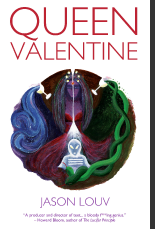Jason Louv’s Queen Valentine: A Romance in Two Worlds
""){ ?> By Ray Tesla
Jason Louv’s new novel Queen Valentine is a hallucinatory trip through the supernatural underbelly of New York City… as one reviewer put it, “Like Alice in Wonderland if Lewis Carroll had overdosed on the opposite of Prozac. A twisted, dark, comical take on the origins of our hopes, dreams and nightmares.”
Louv is best known for his three previously published three anthologies on consciousness studies, Generation Hex (which Grant Morrison called “Your invitation to the party that might just bring the house down”), Ultraculture and Thee Psychick Bible with Genesis Breyer P-Orridge, and although the new book is a foray into fiction, it continues his themes of consciousness expansion, posthumanity, magic and the hidden occult side of the world. I caught up with him briefly by e-mail to discuss the new book.
RAY TESLA: So what is Queen Valentine?
JASON LOUV: It’s a novel exposing the supernatural underworld beneath New York, as seen through the eyes of a young woman who’s lost her soul working in advertising, and ends up stumbling into the world beneath. It’s a bit like Edward Bulwer-Lytton’s The Coming Race mashed up with “Mad Men.”
RT: Can you say more?
JL: Well, the premise is essentially this. In the middle ages, the people of Europe took it for granted that non-human beings — often called the Sidhe or the faery folk — were as real as humans, and regularly trafficked with the human world. Just like “modern” people sometimes claim to see UFOs or to have been abducted by aliens, in the middle ages people often claimed to have happened upon secret Sidhe kingdoms, to have been abducted to faerie land, or to have had their children swapped for faerie babies. That’s where we get a lot of European mythology from. And then we stop hearing about them as soon as the Inquisition and then the Age of Reason come in.
So the question is, what happened to those beings? And the answer in the book is, well, they did what lots of displaced people do. They emigrated to New York, or the settlement that became New York. And they’ve been living in secret catacombs and warrens underneath the city ever since, in their own shadow version of the city and shadow economy — along with their evil half, the Unseelie, who are like creatures created by pure nightmare energy. And after four hundred years, the Unseelie are tired of hiding, and they want to make a bid to subjugate the human side of the city.
RT: What were your main inspirations writing this?
JL: Having been involved both in advertising world and the supernatural underworld of New York.
RT: You’ve previously written about consciousness expansion and magic (Generation Hex, Ultraculture, Thee Psychick Bible) and about the transforming effects of technology on the soul. Do you see this as a continuation or a departure from those topics? Why the switch to fiction?
JL: Definitely a continuation. There’s only so much truth you can express about the hidden corners of reality in non-fiction or essay form before people start wondering if you’re making it up. The threshold is very low. With fiction, hopefully I can put it all in there and instead of that nagging voice in your head while you’re reading it being “I wonder if he made this up,” it might be “I wonder if any of this is actually true?”
RT: So are you saying there’s actually coded occult information in Queen Valentine?
JL: No. Certainly not.
RT: You’ve also written about transhumanism and posthumanity. Does that tie in with the book?
JL: In a way. The book is in many ways a critique of transhumanism from the perspective of the original guardians of the earth, the nature spirits who’ve had to adapt to our technological progress and find a way to live in the cracks like any diaspora culture. A lot of the tension in the book revolves around the different responses from different factions of the Sidhe to the direction humanity is going. There’s also a lot of satire of the Faustian need for physical augmentation. I don’t want to give too much away, but the crux of what’s being discussed is whether humanity will be allowed to manifest the kind of nightmare future that it seems to be hellbent on creating.
RT: Does that mean you have an essentially pessimistic view of the future?
JL: Not really. I’m a great believer in posthumanity. But there’s certainly a dark road that I see people heading down that I think they shouldn’t. I think if we keep pushing on things like genetically modified crops and voluntary surveillance social media there’s a good chance we could end up living a real shit of a situation. I’m disturbed on a daily basis by the fact that we’ve essentially allowed things like Facebook to turn our interpersonal space into a strip mall. And I see one tendency of humanity to become more and more soulless, more and more surrendered to mechanization and regimentation. But luckily we still have things like science fiction to create and advertise better futures. By any imaginary means necessary!
RT: What’s next for you?
JL: I’m done plotting the next book and on into writing it. I’d really like to get into wider media to educate more young minds. That’s what it’s about! I’d like to write some comics if they’ll let me at them.

